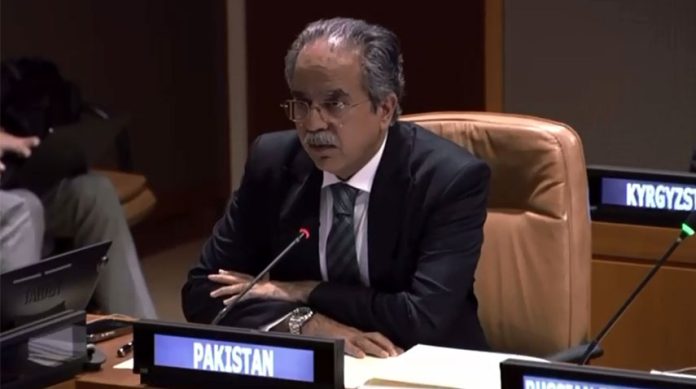UNITED NATIONS, Nov 14 (APP): Amid growing global conflicts and challenges, Pakistan has renewed its call to strengthen the role of UN General Assembly — the only principal organ with universal membership — in resolving international disputes and maintaining peace.
“A revitalized General Assembly is essential to a revitalized United Nations,” Ambassador Asim Iftikhar Ahmad, permanent representative of Pakistan to the UN, told the 193-member Assembly during a debate on ‘Revitalization of the work of the General Assembly’.
The work of the General Assembly, he said, also extends to addressing the root causes of conflict and promoting the peaceful settlement of disputes, including through mediation and arbitration, in line with the UN Charter’s principles.
“For the United Nations to remain credible, its resolutions must be implemented in both letter and spirit,” the Pakistani envoy said, pointing out that they carry not only moral authority but also legal and political weight– reflecting the collective will of the international community.
“All organs and Member States must therefore respect and implement these decisions,” Ambassador Asim Ahmad added.
In this regard, he reiterated Pakistan’s proposal to establish a dedicated mechanism to monitor the implementation of General Assembly resolutions, supported by regular, detailed UN Secretariat reporting. “Such a mechanism would strengthen the Assembly’s effectiveness, accountability, and relevance,” he added.
“We also reaffirm that resolutions remain valid until their mandates have been fully implemented – a principle that underscores the enduring authority and continuing relevance of the Assembly’s decisions.”
Emphasizing the need to look to the future in revitalizing the General Assembly, Ambassador Asim Ahmad said as the world was facing emerging challenges, from the governance of digital technologies and artificial intelligence to the sustainable use of outer space and the global commons, the Assembly must remain at the centre of these discussions to ensure that global governance remains inclusive and equitable.
The Assembly must embody the collective will of member states and ensure that no organ acts beyond the limits of the UN Charter, he stressed.
“The General Assembly’s role in maintaining international peace and security is broad, and complementary, to that of the Security Council,” the Pakistani envoy said, highlighting, “When the Council is unable or unwilling to act, the Assembly is fully empowered to assume its responsibilities under the UN Charter.”
“While Pakistan supports efforts to streamline the Assembly’s work to enhance efficiency and avoid duplication, such measures must not result in privileging one UN pillar over another,” the Pakistani envoy said, noting that the three pillars – peace and security, development, and human rights – are interdependent and merit balanced attention in the Assembly’s agenda.
“We further emphasize the need for transparency in the relationship between the General Assembly and the Security Council, and for predictable and adequate resources for the Office of the President of the General Assembly.
On the appointment of the Secretary-General and executive heads, Pakistan reaffirmed “the principles of transparency, inclusivity, gender parity, and equitable regional representation”, amid calls for appointing a woman as the next UN secretary-general. The tenure of Antonio Guterres, the current U chief, who is serving his second 5-year term, expires at the end of 2026.
Presiding over the meeting, Assembly President Annalena Baerbock of Germany said the revitalization process and a broader reform agenda under the UN80 Initiative were inseparable, stressing that both tracks share a common purpose: to make the United Nations “more effective, more efficient and ultimately stronger”.
But, she also warned, “business as usual will not suffice”.
“We need fewer repetitive resolutions, shorter debates and smarter scheduling” — “no more resolutions for resolution’s sake”, only those that genuinely advance peace, development and human rights, she told delegaates.
Reforms “remain just words on paper” unless implemented in good faith. Assembly resolution 79/327 sets a clear path forward, Ms. Baerbock said, noting that it merges duplicative agenda items, limits explanations of vote, simplifies adoption procedures and encourages biennial and triennial cycles where appropriate.
“We cannot preach on Sunday that we need fewer resolutions, then submit one on Monday,” the Assembly president continued. “Yet, we continue to see resolutions without budgets, high-level meetings that exceed agreed limits, and more than 160 side events during high-level week.
This is “not sustainable”, particularly for smaller missions expected to attend multiple meetings simultaneously, she added.

